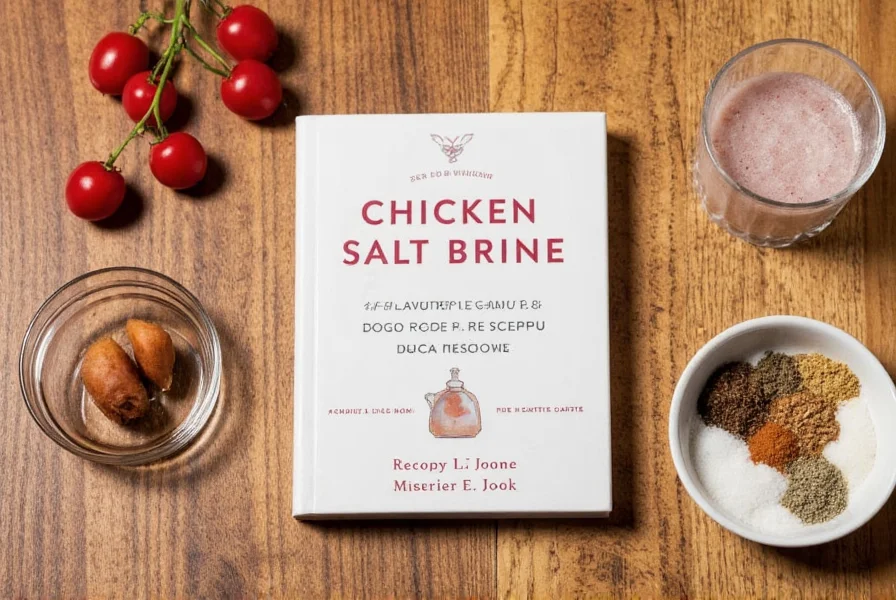Table of Contents
Introduction to Chicken Brining
Brining chicken is a scientifically proven technique that enhances moisture retention and flavor by soaking poultry in a saltwater solution before cooking. This method is recommended by the USDA for safe food preparation and widely used by professional chefs to achieve consistently juicy results. Below is a clear, step-by-step guide based on food safety guidelines and culinary expertise.
Why Brine Your Chicken?
Brining works through osmosis and protein denaturation, offering three key benefits:
- Moisture Retention: Salt solution allows meat to absorb water, preventing dryness during cooking.
- Flavor Infusion: Seasonings in the brine penetrate deeper than surface seasoning alone.
- Tenderness: Salt breaks down muscle proteins for more tender texture.
According to the USDA Food Safety and Inspection Service, proper brining temperature control is critical for food safety. Always keep brined chicken refrigerated at 40°F (4°C) or below.
Step-by-Step Chicken Brine Recipe
For a 4-5 lb whole chicken or equivalent cuts:
- Prepare brine solution: Combine 4 cups (1 liter) cold water, 1/4 cup (60g) kosher salt, and 1/4 cup (50g) brown sugar in a large bowl. Stir until fully dissolved.
- Add flavor enhancers: Include 2 crushed garlic cloves, 1 tablespoon fresh thyme, 1 bay leaf, and zest of 1 lemon.
- Submerge chicken: Place chicken in a food-safe container (BPA-free plastic or glass), ensuring it's fully covered by brine. Cover and refrigerate for 4-12 hours (smaller cuts: 2-4 hours; whole chicken: 8-12 hours).
- Rinse and dry: Remove chicken from brine, rinse under cold water, and pat completely dry with paper towels before cooking.
Important safety note: Never brine at room temperature. Bacterial growth occurs rapidly between 40°F-140°F (4°C-60°C).
| Chicken Type | Brining Time | Temperature Requirement |
|---|---|---|
| Breasts or thighs | 2-4 hours | Refrigerated (≤40°F/4°C) |
| Whole chicken | 8-12 hours | Refrigerated (≤40°F/4°C) |
| Wings or drumsticks | 1-2 hours | Refrigerated (≤40°F/4°C) |
Food Safety and Best Practices
Based on USDA guidelines and food science research:
- Always refrigerate: Brining must occur in the refrigerator. Never leave chicken at room temperature.
- Use food-safe containers: Avoid metal containers that react with salt. Glass or BPA-free plastic is recommended.
- Discard used brine: Never reuse brine that contacted raw chicken due to bacterial contamination risk.
- Thaw completely first: Frozen chicken must be fully thawed in the refrigerator before brining.
- Check internal temperature: Cook chicken to minimum 165°F (74°C) as per USDA standards.
Frequently Asked Questions (FAQ)
- How long should I brine chicken?
- For food safety and optimal texture, brine chicken in the refrigerator for 2-12 hours depending on cut size. Smaller pieces like breasts need 2-4 hours, while whole chickens benefit from 8-12 hours. Never exceed 24 hours to avoid texture changes.
- Can I use table salt instead of kosher salt?
- Yes, but reduce quantity by 25% since table salt is denser. Kosher salt is preferred for even dissolution and better flavor control. Always measure by weight for accuracy.
- Do I rinse the chicken after brining?
- Yes, rinse thoroughly under cold water to remove excess surface salt. Pat dry completely before cooking to ensure proper browning and crispy skin.
- Can I reuse brine that contacted raw chicken?
- No. USDA guidelines strictly prohibit reusing brine that has touched raw poultry due to high risk of bacterial contamination. Always prepare fresh brine for each batch.
- What's the difference between wet and dry brining?
- Wet brining (liquid solution) provides faster moisture absorption and flavor infusion. Dry brining (salt rub) creates crisper skin but requires 12-24 hours in the refrigerator. Both methods are safe when following USDA guidelines.
- Can I brine frozen chicken?
- No. Frozen chicken must be fully thawed in the refrigerator before brining. Brining frozen poultry causes uneven absorption and creates food safety risks due to temperature fluctuations.











 浙公网安备
33010002000092号
浙公网安备
33010002000092号 浙B2-20120091-4
浙B2-20120091-4